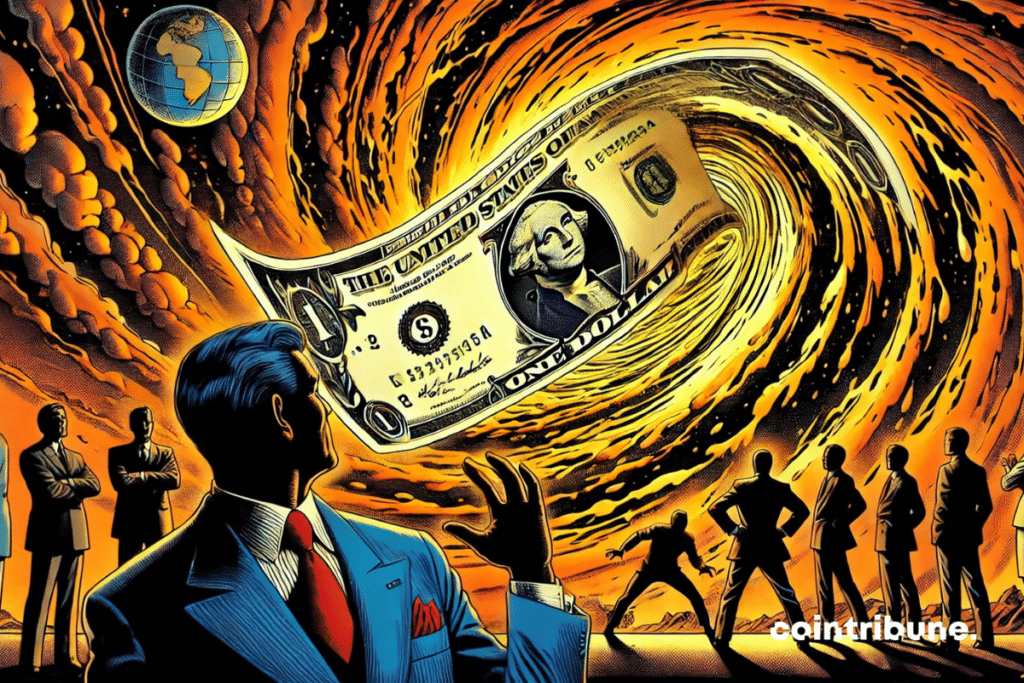Donald Trump Ready To Tax BRICS To Maintain US Dollar Dominance
The dominance of the US dollar in international exchanges is more contested than ever. A powerful bloc, the BRICS, is actively seeking to free itself from it by developing an alternative currency. In response to this offensive, Donald Trump, true to his style, does not intend to remain a spectator. The American president wields the threat of massive economic sanctions to deter any attempt to undermine the hegemony of the greenback. But can this strategy really reverse the trend, or does it risk accelerating the ongoing dynamics?

Trump brandishes the threat of sanctions and tariffs
Upon his return to the White House, Donald Trump adopted a radical position against the monetary initiatives of the BRICS. He publicly denounced their desire to reduce dependency on the dollar and to build a viable alternative. In a striking statement, he warned: “We urge these countries to abandon their plan for a common currency. If they persist, they will face 100 % tariffs and completely lose access to the American market.”
This warning fits into a broader strategy where Trump relies on economic pressure to maintain the hegemony of the dollar. He is not solely targeting the BRICS: Canada and Mexico are also at risk of a 25 % tax on their imports, and China could face a new 10 % levy on its exports to the United States. The goal is to slow down any attempts at monetary diversification and to maintain the centrality of the greenback in global transactions.
But while Trump hopes to paralyze the efforts of the BRICS, the facts show that these threats tend to have a catalyzing effect. By attempting to lock the monetary system under American influence, he fuels distrust and pushes his adversaries to find alternative solutions more quickly.
The BRICS : a dynamic of disruption already engaged
Although the idea of a common currency for the BRICS remains technically complex, the initiative symbolizes a very real ambition: to reduce dependence on the dollar. China and Russia, at the forefront of this movement, are multiplying agreements for trade in local currencies. Beijing, in particular, is relying on its digital yuan to facilitate exchanges independent of the American financial system. The Belt and Road Initiative plays a key role as well, by encouraging direct payments in yuan for international infrastructure projects.
However, Trump’s attitude, far from dissuading the BRICS, strengthens their determination. American monetary policies, especially the use of the dollar as an economic weapon, fuel mistrust. Moreover, the systematic recourse to sanctions and embargoes pushes the US rivals, as well as some allies, to diversify their reserves and payment systems.
In this dynamic, the real question is not whether the dollar will lose its hegemony, but when and how this transition will accelerate. Trust in the American financial system is gradually eroding. If Trump persists in this confrontational policy, he risks accelerating exactly what he seeks to prevent: a world less dependent on the dollar and more multipolar in monetary terms.
Maximize your Cointribune experience with our "Read to Earn" program! For every article you read, earn points and access exclusive rewards. Sign up now and start earning benefits.
Diplômé de Sciences Po Toulouse et titulaire d'une certification consultant blockchain délivrée par Alyra, j'ai rejoint l'aventure Cointribune en 2019. Convaincu du potentiel de la blockchain pour transformer de nombreux secteurs de l'économie, j'ai pris l'engagement de sensibiliser et d'informer le grand public sur cet écosystème en constante évolution. Mon objectif est de permettre à chacun de mieux comprendre la blockchain et de saisir les opportunités qu'elle offre. Je m'efforce chaque jour de fournir une analyse objective de l'actualité, de décrypter les tendances du marché, de relayer les dernières innovations technologiques et de mettre en perspective les enjeux économiques et sociétaux de cette révolution en marche.
The views, thoughts, and opinions expressed in this article belong solely to the author, and should not be taken as investment advice. Do your own research before taking any investment decisions.